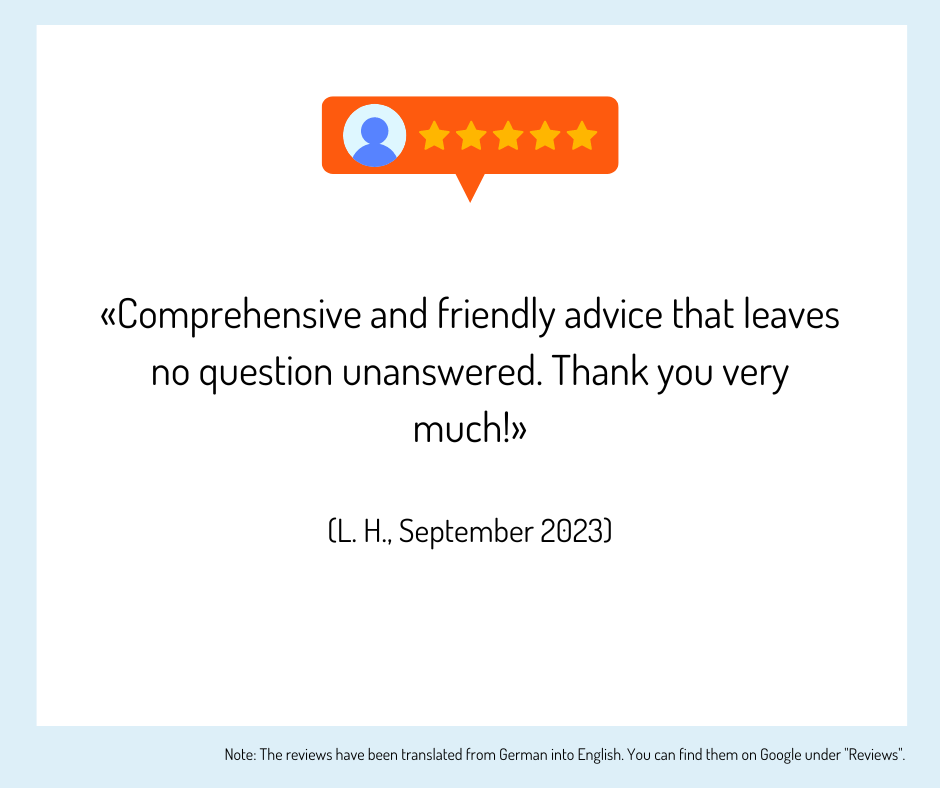Business Informatics Bachelor (FH) (Region Virtuelles Klassenzimmer):
1 Provider
Request convenient free information on Bachelor Business IT Specialist FH: Study, further education, training, overview of providers, tips from the providers of your choice below now.
Sofort zur richtigen Weiterbildung
Questions and answers
Is there also a distance learning course in Business Informatics FH as "Fern FH Wirtschaftsinformatik"?
There is also a distance learning course in Business Informatics FH in the sense of a "Fern FH Wirtschaftsinformatik". This is offered by the Fernfachhochschule Schweiz. However, 20% of the course is also taught face-to-face. The distance learning Business Informatics FH course lasts nine semesters and initially covers the basics such as business informatics, economics, computer science, scientific skills and mathematics. From the sixth semester onwards, students can tailor their studies to their own wishes by choosing elective and specialization modules. Specialization options include Smart Knowledge Management, Information Security and Human Computer Interaction. Certificates from renowned providers such as SAP, IPMA or ITIL can also be acquired.
What usually arouses interest in studying business informatics at FH?
The education portal Ausbildung-Weiterbildung.ch conducted a survey to find out why people decide to study business informatics at a UAS. These are the results:
- 75% would still like to align their studies with their own needs
- 12.5 % would like to study because of a recommendation
- 12.5 % are interested in this course because the degree is required in job advertisements
- One free text answer is: "I have been very interested in this subject area for several years."
What personal requirements should you meet for the Business Informatics University of Applied Sciences?
You should fulfill the following personal requirements for the Business Informatics University of Applied Sciences:
- logical and abstract thinking
- quick comprehension
- Mental flexibility in dealing with language and image content
- Spatial imagination
- Strong ability to concentrate
- Systematic way of working
- good knowledge of English
- Ability to work in a team
How does the Business Informatics Bachelor's thesis work?
The Business Informatics Bachelor's thesis is often an individual work, but at some universities of applied sciences it can also be written in a small group and rounds off the studies at the university of applied sciences. This thesis is also known as the Business Informatics Bachelor's thesis. In this thesis, an application-oriented problem is dealt with in a scientifically sound manner. The business informatics bachelor thesis topics are very diverse. As a rule, 12 - 15 ECTS credits are awarded for this independent written work on a problem from Business Informatics Bachelor topics using scientific methods.
Business Informatics Bachelor: How is the Business Informatics course structured?
A Bachelor's degree in Business Information Systems takes three years full-time or four years part-time. The business informatics course consists of compulsory modules, compulsory elective modules and elective modules. Universities of applied sciences also offer various specializations and areas of specialization. Common modules in the Bachelor of Business Informatics include
- Business administration
- Computer science
- Mathematics
- Information management
- Programming
- Software Engineering
- Operating systems
- English
- Project management
Possible specializations for the Bachelor's degree in Business Informatics include Project Management, Business Analysis, Digital Business Management, Business Software Development, Human Computer Interaction, Knowledge Management, Information Security or Enterprise Architecture. There are usually additional project modules or an internship. The degree program concludes with a Bachelor's thesis in Business Informatics. If you successfully complete this business informatics course, you will receive a federally recognized "Bachelor of Science (FH) in Business Informatics" diploma.
Bachelor in Business Informatics: What after the Bachelor in Business Informatics UAS?
After the Bachelor's degree in Business Information Systems UAS, there are various opportunities for continuing, further training. There are easier courses offered by Universities of Applied Sciences and professional associations. However, the logical path after a Bachelor's degree in Business Information Systems would be to complete a Master of Science in Business Information Systems. Further alternatives after the Bachelor's degree in Business Information Systems would be postgraduate courses at Universities of Applied Sciences or FIT. If you would like to pursue a career in education, you can become a specialist teacher for information and communication technology at vocational schools.
Studying Business Informatics: Which is better Business Informatics or Computer Science?
Business informatics researches and develops IT tools. The aim is to facilitate activities in the administration, organization and management of companies and public authorities. In the Business Information Systems course, students deal with the design, development and application of information and communication systems. This subject area combines applied computer science with business administration. This combination of business informatics studies enables the integrative consideration of business processes - in the creation of requirements analyses, process flow optimization, the evaluation of hardware and software investments or the creation of IT or e-business strategies.
The computer science degree course focuses on pure computer science and technical aspects such as programming language, system technologies, data and network structures, information technologies, software quality assurance, web development, IT security and communication technologies. Despite the analytical focus, there are plenty of practical learning units. Computer science students can specialize in various areas, such as business informatics. Here the emphasis is more on computer science and less on business studies.
When choosing whether it is better to study business informatics or computer science, you should be clear about how high the proportion of business administration or computer science should be. At the extremes, the ratio is 70 to 30 percent for both computer science and business administration. It is therefore a question of interest - is the focus more on pure computer science or on mediation between computer scientists, companies and software users. In the latter case, you should choose the Business Informatics course.
Why do prospective students enquire about a Bachelor's degree in Business Information Systems at universities of applied sciences?
Prospective students make inquiries to universities of applied sciences about the Bachelor's degree in Business Information Systems for the same reasons. This is confirmed by a survey conducted by the education portal Ausbildung-Weiterbildung.ch:
- 67 % according to an online assessment
- 0 % on the basis of a recommendation
- 33 % already knew the school beforehand
Business Informatics Bachelor Salary: How much do you earn as a business informatics specialist?
In Switzerland, a business informatics specialist earns an average of CHF 102,075. However, depending on the canton, the business informatics bachelor's salary varies between CHF 65,000 and CHF 115,000. With a degree from a University of Applied Sciences, the business informatics bachelor's salary is CHF 98,515. The entry-level salary for business informatics is around CHF 79,000.
Business informatics jobs: What can I do as a business informatics specialist?
In business informatics jobs, you act as a bridge builder between economic and information technology requirements. Business IT specialists deal with the areas of business intelligence, information management, information and communication systems, internet economics and process management. This is what business IT specialists do. The activities of an Information Systems Specialist CHE are in detail:
- Develop and implement systems
- Support and optimize business processes with professional information systems and IT solutions
- Computer-aided solutions for various business areas
- Efficient data organization and data management
- Requirements analyses
- Data collection
- Creating specifications and evaluating solutions
- Coordinate projects: Responsible for projects, technical implementation, programming and networking, migrating data, creating documentation and manuals and training users.
Business IT specialists CHE take on challenging tasks in project management and as managers in companies in the business sector. Business informatics jobs are available at IT service providers, software manufacturers, management consultancies or IT departments of larger companies. Business IT specialists UAS work there as project managers, consultants, concept developers or business analysts.
Why Business Informatics FH or Uni?
The Business Informatics degree program is interdisciplinary and combines computer science skills with management knowledge. At universities of applied sciences, business informatics is offered as a separate subject and is therefore a so-called mono-subject course. The content of the "Business Information Systems UAS" course is application-oriented and practical project work in cooperation with companies is an integral part of the course. Business informatics is not offered at all universities. It also differs whether it is a separate degree course, as at the University of Fribourg, a minor subject/minor, as at the University of Bern, or a specialization within the computer science degree course, as at the University of Zurich.
But why business informatics FH or university? FH is practice-oriented, places a lot of emphasis on the technical part and comes up trumps with lots of exercises, sample solutions and discussion of solutions. In other words, there is less dry theory and more emphasis is placed on practical things from everyday life, which you usually experience in parallel at work. Some students appreciate this as it helps them to learn in a more sustainable way. The professor clarifies open questions or gives additional tips. The advantage of this is that it creates a situation that can only be useful later in your career, for example for customer contact. So you are not just left to your own devices. Practical relevance often means that many practical phases take place in companies at a UAS. However, when it comes to the question "Business Informatics UAS or university?", you should also be aware of the advantages of university. Efficient learning from books, which are usually based on real business situations. In addition, students also work with software and programming languages that will be used later in their careers. The university is for students who really want to do science and are confident in doing intensive mathematics. If you are into theory and are aiming for a doctorate in computer science, you should go to university. However, the more practical orientation of UASs is a clear plus for many.
Business informatics student: Where is the best place to study business informatics?
Studying business informatics is an interdisciplinary and application-oriented course that combines computer science skills with management knowledge. You can study business informatics at various Universities. Ideally, you should have a high school diploma with a focus on mathematics or economics or have completed a preparatory course in mathematics. If you have a Baccalaureate, you usually need proof of one year's professional experience. Programming skills are occasionally required. A business informatics student needs a flair for mathematics and computers. Students can set their own specializations through elective modules. It is therefore worth comparing the individual courses. At the Universities of Applied Sciences, business informatics is offered as a mono-subject program (separate subject). The Business Information Systems UAS student studies application-oriented with practical project work. The degree program in Business Information Systems UAS is offered at eight Universities of Applied Sciences in different regions or at the Distance-Learning University of Applied Sciences Switzerland. At universities, you can study business informatics as a separate major or only as a minor subject. At other universities, it is even just a component within business studies or a specialization within computer science studies.
Tips, tests and information on "Business Informatics Bachelor FH"
Erfahrungen, Bewertungen und Meinungen zur Ausbildung / Weiterbildung
Haven't found the right training or further education yet? Benefit from educational advice now!
Further training is not only important in order to maintain or increase professional attractiveness, investing in training or further training is still the most efficient way to increase the chances of a pay rise.
The Swiss education system offers a wide range of individual training and further education opportunities - depending on your personal level of education, professional experience and educational goals.
Choosing the right educational offer is not easy for many prospective students.
Which training and further education is the right one for my path?
Our education advisory team will guide you through the "education jungle", providing specific input and relevant background information to help you choose the right offer.
Your advantages:
You will receive
- Suggestions for suitable courses, seminars or training programs based on the information you provide in the questionnaire
- An overview of the different levels and types of education
- Information about the Swiss education system
We offer our educational counseling in the following languages on request: French, Italian, English
Register now and concretize your training plans.













